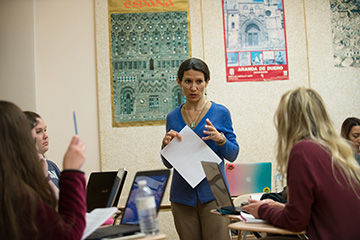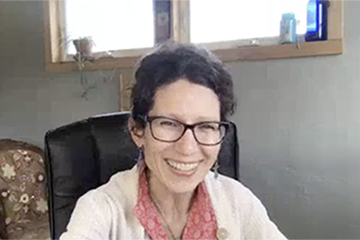
10/27/2020
SUNY Cortland professors are teaching during an unprecedented semester created by the COVID-19 pandemic. Through all of the challenges, faculty members have stayed dedicated to their craft in attempt to create meaningful experiences for their students. This profile continues a five-part series.
At every grade level from kindergarten to college, teachers have emerged among the many unsung heroes of 2020. Shena Salvato is one shining example for SUNY Cortland students learning how to teach English as a new language (ENL) in their future classrooms.
A full-time lecturer, this semester Salvato juggles five classes across both the undergraduate and graduate levels. Two were fully online while the others offered in-person instruction before the university’s pause. But the switch to shorter classes early in the semester created new hurdles; losing 20 minutes inside of the classroom meant more planning and follow-up outside of it.
“I feel like one role I can play is teaching students how to make this work,” Salvato said, suggesting that the pandemic has forced teachers at all levels to consider new tools and practices.
In her TESOL classes, aspiring teachers learn about approaches to take with students who are not proficient in English. TESOL majors take 12 credits of a foreign language. While ENL teachers do not have to be able to communicate in all of the languages of their students, having a solid foundation in an additional language helps teachers better understand the language learning process, and enables them to relate to their students’ challenges with learning English, Salvato said. She focuses on the methods of teaching ENL and starts by building rapport with them.
“I really try to walk the talk working with pre-service teachers,” she said. “I try to give them exposure from a teacher’s perspective and a student’s.”
|
|
| Shena Salvato, a full-time lecturer in the Modern Languages Department, smiles during an online class. Note: the above left photo was taken in 2017. |
In all of her courses, she moved an important introductory activity online this semester. Previously, students wrote down on paper answers to big-picture questions about themselves and their ambitions; this semester, it turned into an online journal that allows for back-and-forth, one-on-one discussion with their professor. The exercise allows students to witness their own personal development throughout the semester.
“This has nothing to do with content,” she said. “It’s about developing a connection.”
During the pandemic, she has noticed far more depth in student responses on Blackboard, the university’s main online learning platform. Students seem more willing to share their own experiences, ask questions or point out their confusion with a topic, Salvato said. A major reward so far has been rich discussion among students outside of the classroom.
Salvato has been encouraged by small but meaningful moments. One student saw inspiration in a course topic and asked Salvato to be the advisor for an Honors Program thesis, even though the student pursues a major outside of the Modern Language Department. Another student expressed strong interest in teaching abroad after graduation and sought advice from Salvato, who taught in Costa Rica for three years.
“It’s exciting that students are thinking beyond current limitations,” Salvato said. “That’s encouraging.”
--
Do you know a SUNY Cortland professor or student who has done something interesting in their classes during the pandemic? Email communications.office@cortland.edu
